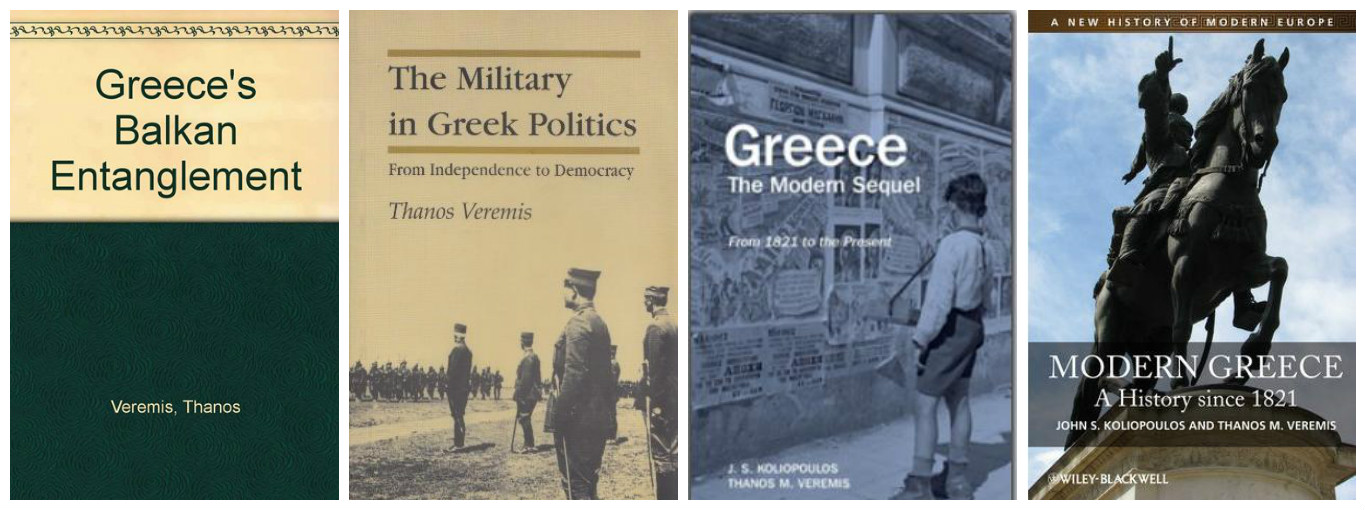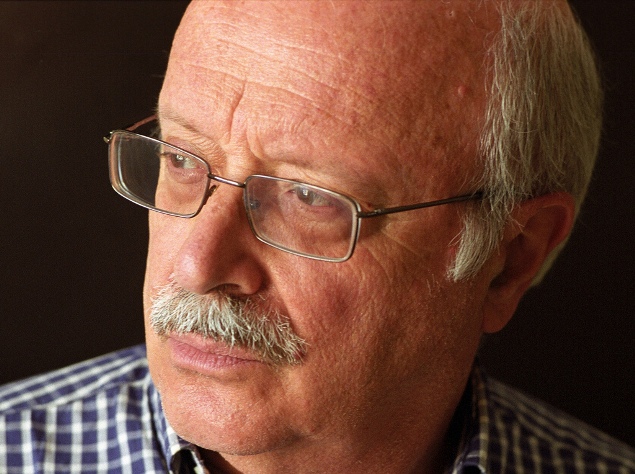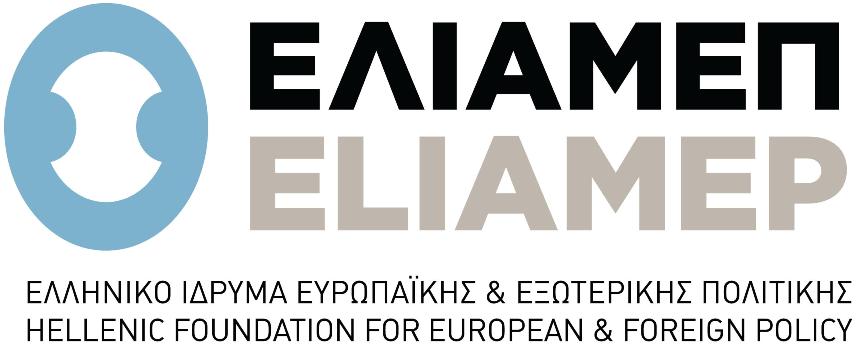Thanos Veremis is Professor Emeritus of Political history at the University of Athens, Department of European and International Studies and Founding Member of the Hellenic Foundation for European and Foreign Policy (ELIAMEP). Professor Veremis was educated at Boston University and the University of Oxford and has served as a professor and a researcher at universities in Europe and the USA. He was the first Constantine Karamanlis Professor at the Fletcher School of Law and Diplomacy, Tufts University (2000-2003) and he served as President of Greece’s National Council of Education, 2004-2010.
His many publications include: Historical Dictionary of Modern Greece (1995, with Mark Dragoumis); Greece’s Balkan Entaglement (1996), The Military in Greek Politics (1997); with Mark Dragoumis, Greece, World Bibliographical Series, vol.17 (1998); with John Koliopoulos, Greece. The Modern Sequel (2002); with Mark Dragoumis, Greeks and Turks in War and Peace (2007) and with John Koliopoulos, Modern Greece: A History since 1821 (2010). His latest book (in Greek, 2017) is Leaders of Μodern Greek history: Fame and Deadlocks.
Professor Veremis talked to Greek News Agenda* about the relations between Greece and the Former Yugoslav Republic of Macedonia after the change of Government in FYROM, stressing that the new Government under Zoran Zaev marks a change in the atmospherics for the two countries, but the name issue remains. Regarding the European policy for the Balkans, he expresses his hope that once the EU returns to its economic growth of the past, these territories will become part of the European family and that in the meantime they can prepare themselves for the Integration, a procedure which should be a modernization process, leading to states of citizens of equal status vis a vis the Law. He stresses the importance of education, expressing optimism that, when Greece returns to normality, its highly educated human capital will help the country resume its leading role in the Balkans.
ELIAMEP has a long tradition in Balkan affairs research and policy analysis, going back to the period of its founding in 1988. Have ELIAMEP’s research priorities regarding the region changed since then?
Well, in a way, we have drifted into EU affairs, but there is always interest in SE Europe. Recently we had a meeting in Athens with representatives of FYROM, so we are back in business, so to speak. The meeting was about current developments in FYROM, where there has been a change of government. There is a new government under Zoran Zaev now, instead of Nikola Gruevski and this has opened opportunities for discussions between the two Foreign Ministers, Nikos Kotzias of Greece and Mr Dimitrov of FYROM, who recently met.
Is there a new perspective in Greek – FYROM relations after the change of government in FYROM?
The atmospherics are much better now than they used to be. In fact the relations between Greece and FYROM were pretty bad throughout the years of Mr Gruevski, because Mr Gruevski made it his point to bring up issues that were not very pleasant between the two countries and therefore relations deteriorated, so to speak, whereas now things are beginning to look up.
The government has a rather weak majority in the parliament.
That’s very true. Mr Zaev’s government became possible mainly because of the Albanian national group of FYROM, and Mr Zaev is drawing from that support to create a Government. Mr Gruevski still has a majority vote among the Slav Macedonian element in that country and therefore he may always return in the future, depending of course on how Zaev’s government performs. If it performs well, Mr Gruevki’s possibilities will decrease, because, apparently, he hasn’t done a very good job in the economy and elsewhere and the relations between the two national groups, the majority element, the Slav Macedonians and the minority element, the Albanian members of the state, have been bad. So if things improve in various sectors, the new Government may succeed, but so far, as I said, there has been an improvement of atmospherics, which is, unfortunately, not substantial yet.
Mr Dimitrov, who visited Athens, and spoke with the Greek foreign minister, Mr Kotzias, did so in a very improved climate. Mr Kotzias even said that irrespective of the name issue and how that goes, relations between the two states will and have to improve. So there has been a good exchange of intentions. Of course, the question of the name remains, which is something that many people, especially those who know very little about the history of this part of the world, and, especially, the history of the Greek Civil War, have to consider.
Joint statements of Foreign Minister N. Kotzias and the Foreign Minister of the former Yugoslav Republic of Macedonia, N. Dimitrov, following their meeting (Athens, 14 June 2017)
The Greek Civil War took place from 1946 to 1949, between a Communist, a minority segment of the population, but still strong in terms of military capability, and a majority element which was against the Communist regime. One of the issues that was fought over during the Civil War was the change of regime, of course, but it wasn’t just that issue; the future of Greece’s part of Macedonia was also an issue over which the civil War was fought. In other words, I can’t think of any Greek political party that will sign an agreement with FYROM, if there is no alteration of the name, a composite name, not just Macedonia, because that lays claims or makes it very difficult to explain the existence of the other Macedonias: There is a Former Yugoslav Republic of Macedonia, there is a Greek Macedonia, as that section of Greece is named and there is also a Bulgarian Macedonia that is a part of Bulgaria and a small segment in Albania. So when someone speaks about Macedonia, one must qualify which one and that is why no one should claim the absolute use of the term without any prefix.
What is the role of the FYROM ethnic parameter in the name issue?
Speaking as an academic and not a politician, there is a “flaw”, if I may say so, in the Constitution of 1991 of FYROM, in the sense that it was based on national identities rather than political identities. In other words, instead of addressing citizens of a state, the Constitution addresses national elements, national majorities and national minorities. I think it would make it much easier for them, now and in the future, should they reform the Constitution to address citizens of equal status vis a vis the Law rather than national groups.
What about the Confidence Building Measures that were proposed by Foreign Minister Kotzias? They have been viewed positively thus far.
Probably, I’m not in a position to say. I was not present in the discussions. We know about them only through the media. I hope there will be improvement. One improvement would be to strike off the irredentist nature of school books. School books in FYROM, as I remember, describe that state as a littoral state, which means a state that is near the Sea, near waters of one kind or another. So, if they describe their state in school books as littoral state, that implies that a part of Greece is historically a part, or should be a part of that state. Of course, this is highly unacceptable. So I think schoolbooks should be reformed as part of the confidence building measures between the two states. Schoolbooks in my point of view are very important, because they give you an idea of how the future citizens will think about each other.
South East European states have to face the consequences of the EU’s Enlargement fatigue, while they also feel reform fatigue.
This is a problem of clashing priorities. We hope that EU will be able to revive itself. Frankly speaking, the European Union has very few parts of geographic Europe left out of the EU nowadays. There is Switzerland and Norway of course, which have not joined the EU for their own good reasons and the Western Balkan states. My hope is that once the EU returns to its economic growth of the past, we will see another growth into these territories that have been left out. So, those who did volunteer to become members of the EU should not feel excluded, they should also try to change their ways, their ideas of what makes a democratic state: a state of citizens of equal status vis a vis the Law, not segments of nations that aspire to prevail in the state. Once upon a time this was understandable; it happened in Europe, everywhere, but not anymore. This is a thing of the past that has to be forgotten and change.
There is a common pattern in the former Communist states that are seeking Euroatlantic membership. They are reliving rather than bypassing their communist past. They begin with a nationalist Constitution and rather nationalist – irredentist claims. In the 21st Century the Balkan states have to regain the time lost. We can’t afford to relive the past.

Nevertheless, the EU continues to encourage these States for reforms, although a new Enlargement is not visible in the near future, at least for five years. Is there a paradox here?
Five years is not too much in the course of History. I mean, a state should be able to reform itself, prepare itself and five years go by very quickly. I think there is not only a chance but a certainty that all the states that have been left out of European enlargement will join in the near future, but, of course, not in a state of disrepair and irredentist claims against each other. That will not do. One cannot incorporate states that behave as ideological groups of the Middle East behave. These are not things we can afford to encourage anymore.
Is there a distinct European policy for the Balkans?
There have been many in the past and I think they can serve as samples of where the Balkans should be and should be heading. Some cases have worked very well. Consider Rumania, Bulgaria and then Croatia, which entered the EU by adhering to some of the prerequisites of the EU, especially Rumania and Bulgaria. Consider now the relations between these states and Greece, for instance, as opposed to what the case was twenty or thirty years ago. Relations were very bad between these states, mainly because of different regimes, different requirements and prerequisites. The EU was obviously not present yet. Things have changed to the better, to the best I’d say. So, if we take these states as examples and consider the various European directives that have been used throughout the Yugoslav wars, then we have a repository of ideas on how to become a modern state in the Balkans.
On the other hand, EU foreign policy has been criticized for lagging behind the US in the case of the Balkans.
Even international organizations, such as the EU states, which are a relatively recent phenomenon in history, make mistakes. All live organizations do, but they correct themselves. I agree that they may have mistaken assumptions about certain SE European states in the past and FYROM is a good example, but the USA also made a faulty assumption vis a vis FYROM, when they recognized FYROM under its constitutional name (Republic of Macedonia), when Mr Bush was President and Mr Cheney was Vice President. I think that was a mistake. They didn’t know the history nor did they care, they thought at that time that recognition would normalize domestic relations in that state. Obviously, it did not, because then the clash between Albania and Slavomacedonians occurred and the US had to rush for the Ochrid Agreement.
So mistakes are made and will be made throughout the development of international relations, but that doesn’t mean there isn’t a clear route of development. Some states have managed to follow that route and do so very well. Some have not; they have lagged behind. My feeling is that, sooner or later, there will be an improvement everywhere. The Balkans will act as the rest of Europe does. In other words, relations between France, Italy and Germany etc are a far cry of what they used to be in the first part of the 20th Century. I am sure the same improvement will occur with the Balkan states in the near future.
With Europe facing one of its biggest crises in its history with Brexit and other centrifugal powers, how are Russia, Turkey and the Trump Presidency influencing European policy concerning the SE European states?
For one thing, as regards Brexit, which is probably the most obvious case of moving away from the EU, my feeling is that the British will return, not necessarily tomorrow or the day after, but since there are negotiations between the EU and UK, I believe that in a slower movement there will be a kind of improvement of relations which will lead to a comeback. My feeling is that the British are already accessing the dark side of their decision and that they will realize they made a mistake, not tomorrow, but in the near future, I would think.
As far as the rest, the outsiders, are concerned, Russia is a very interesting case. It is a very advanced society in terms of education, sciences and technology. It has problems in its economy, but it’s a country of great natural recourses. Turkey is very complicated example. Instead of proceeding forth, it seems to be backtracking in the sense that the state is becoming much more authoritarian. Mr Erdogan has invested all power to himself and that makes it very difficult to draw conclusions about the future. In that sense Turkey is still a big question mark for Europe.
As regards the Trump Presidency, the USA is the most advanced country in not all, but many fields. Yet this very advanced country surprised the world with the election of Trump, but it is much too early to draw conclusions.
Greece used to be at the forefront of the SE Integration process. What is Greece’s current role in the region in the economic crisis years?
Greece is not where it used to be. Greece was by far the richest country in the Balkans. It has lost ground, especially in per capita income. My feeling is that the economic crisis is a temporary setback and we will be back where we used to be and perhaps even better, should we learn from this experience.
I’m very optimistic about the future of this country, because I know its human resources. I was a Professor at the University and some 5-10% of the students were superb, better than in any other place I’ve been to. The average Greek family has been investing its entire savings towards the improvement of its children’s education. This has been traditional in Greek history, but more so in the last thirty years of Greek history. Of course, a significant brain drain has taken place, but still those that remain are well educated and will do very well in the future, should the political elite lives up to that standard. In other words, it’s not the society that needs to live up to its political leaders, but the political leaders must learn to live up to the average citizen of Greece.

It was the opposite in the 19th and earlier 20th century, where political leaders and political elites were superb. I will only mention a few politicians names, such as Ioannis Kapodistrias, Alexandros Mavrokordatos, Alexandros Koumoundouros, Spyridon and Harilaos Trikoupis, Panagis Tsaldaris and Eleftherios Venizelos. They were great people in terms of their political capabilities, in a society that was less developed and less educated, compared to contemporary Greek society. Fewer people attended University, whereas everybody does now. This is not to say that Greek Universities are good, they have gone down the drain quickly, but they need to be improved as well.
Once we manage to do all that, I think we will be in a much better state than we used to. As far as Greece’s role in the Balkans is concerned, I think that once Greece returns to normality, it will also play a leading role as it did when it was strong in business. Greece could bring its businesses into the Balkan states as it did for a very long time and I think it will do again in the future.
* Interview by Florentia Kiortsi














